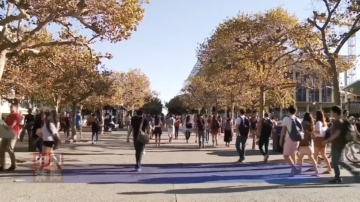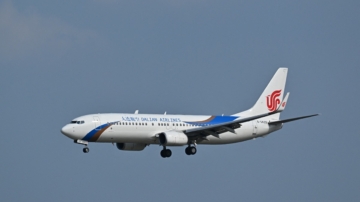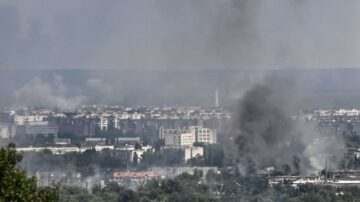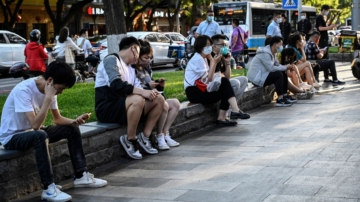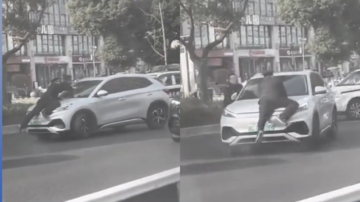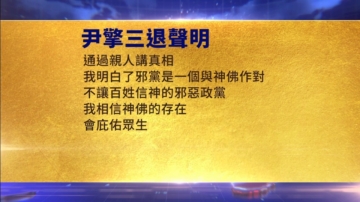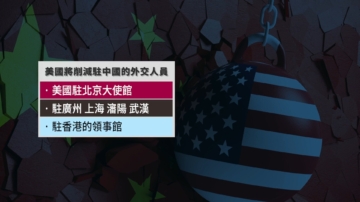【新唐人2011年8月1日訊】溫州「動力火車」撞毀事故29號「頭七」,中國大陸全國多家報紙不約而同,準備好許多版位報導事件,並悼念死難者,但卻在中宣部的禁令下撤版,有些報章以近乎「開天窗」方式,表示不滿。不過,仍有大批媒體抗命。其中,《經濟觀察報》以八個版面的「特別報導」,詳細分析了「溫州動車事故」。
從7月30號開始,「溫州動車追撞事故」的相關報導,進入噤聲期。
29號晚9點左右,中共政治局常委李長春長期控制的「中宣部」,連續下達3道封殺令,對於大陸媒體報導溫州動車事故,「除正面報導和權威部門發佈的動態消息外,不再做任何報導,不發任何評論。」
一名廣州報社的資深編輯透露:當晚,百家報紙在撤版,千位記者被斃稿。
據了解,《21世紀經濟報導》和財經週報《中國經營報》接到禁令後,各自撤下8個相關版面﹔《新京報》、浙江的《錢江晚報》和西安《華商報》等也都撤下了原本準備好的版面。
中宣部的禁令引起了大陸媒體的強烈反應。上海《青年報》、《東方早報》和廣州《南方都市報》等,都以「開天窗」的方式表達不滿。此外,有多家報社的編輯在微博上貼出了被撤下的版面,也有記者在個人微薄上轉播再也無法上版的新聞。
不過,中共當局鎮壓輿論的鐵腕作風,反而引爆中國近年罕見的“媒體抗命潮”。
上海《青年報》30號頭版,是以獲救的小女孩伊伊笑臉圖片,配以“伊伊,一定要好好長大”的文字,玩擦邊球,繼續報導事故真相。
《經濟觀察報》30號同樣以醒目的標題≪溫州沒有奇蹟≫,揭開了8篇強有力的問責。其中問:≪誰是真兇≫、≪鐵道部在掩飾甚麼?≫。還提了一些設想,例如≪全國人大應啟動特別調查程序≫、≪請為死難者立碑≫、≪請敬畏生命≫、≪分拆鐵道部≫等等…。《經濟觀察網》還以「經濟觀察報九評 溫州動車追尾事故」專題,評論這起事件。
而《新京報》將原本的頭版改為北京暴雨,但以《7日雨未絕,1天2預警》為標題,似乎想用氣象比喻心境。
有報社編輯呼籲報社老總鼓起勇氣抵制禁令,「站著把新聞做了」。媒體人阿丁說:「媒體老總們,請在此刻積蓄勇氣、喚醒良知……禁令是用來突破的不是用來奴才聽令的,繩索是用來掙脫的不是拿來自縛手腳的。」
《蘋果日報》報導,大陸傳媒研究者統計發現,29號至少有近百家「都市類報紙」,引用溫家寶「要給群眾真相」、「是否救人第一,鐵道部要回答」等做頭版大題,形成「千夫指向鐵道部」輿論傾向。這和2008年5.12「四川大地震」後的沉默相比,大陸媒體在溫州火車事故中顯然「人性」有所擡頭。然而, 「人性」的一面最終會不會戰勝「黨性」,令人拭目以待。
《九評共產黨》書中「以黨性取代和消滅人性」寫道:「共產黨員以及共產社會的人民首先被要求的,是絕對的服從,這是所謂組織路線的全部內容。……按照共產黨的要求,(黨性)永遠超越普遍人性而存在。……一個黨員,無論他在私下對你表達了怎樣的意見,但一旦作為黨員表態時,必然要和『組織』保持一致。」
新唐人記者吳惟、周昕屹綜合報導
Banning Train Crash Reports
After the major crash of high-speed train near Wenzhou,
many Chinese newspapers were preparing feature reports
on the incident and to mourn the crash victims.
However, the Chinese Central Propaganda Department
(CCPD) issued orders to ban such reports.
Some newspapers left the pages blank
to express their dissatisfaction.
However, a large number of media still disobeyed.
For example, Economic Observer News published 8 pages
of "special reports" to analyze the crash.
Since July 30, no report on "Wenzhou high-speed rail crash"
is allowed to be published.
On July 29, CCPD issued three consecutive orders
to ban all mainland reports on Wenzhou high-speed rail crash,
demanding “no more reports and no more comments
besides reporting positive news and info issued by authorities.”
A senior editor of a Guangzhou-based newspaper said,
“Tonight, hundreds of newspapers change pages;
thousands of journalists' articles are rejected.”
It is said that 21 Century Business Herald and
China Business changed eight relevant pages.
Beijing News, Qianjiang Evening News, China Business Daily
also changed their original planning.
CCPD's prohibition caused strong reactions
from the media.
Youth Daily, Shanghai's Oriental Morning Post and
Southern Metropolitan Daily
all left their pages blank to express their dissatisfaction.
Also, editors of many newspapers posted the original pages
on micro-blogs;
journalists posted some never-to-be-published news articles
on their personal micro-blogs.
The communist authorities' high-handed suppression of
public opinion ignited the Chinese media's disobedience.
It is rarely seen in recent years.
On July 30, Youth Daily's headline was a smiling Yiyi,
an infant girl that was rescued from a crashed train carriage,
with the words, “Yiyi, you must grow up well.”
Thus, it was able to continue reporting the truth indirectly.
Also on July 30, Economic Observer News published
eight articles of powerful criticism
with a striking title “No miracles in Wenzhou”.
The articles were “Who is the real killer?” and
“What is the Ministry of Railways trying to hide?”
It also provided some suggestions, such as
“National Congress should start a special investigation,”
“Please construct monuments for crash victims”,
“Please respect people's lives”, “Split the Ministry of Railways”.
Economic Observer News also commented on this incident
with a special topic “The Nine Commentaries on Train Crash.”
Beijing News changed its first page to report
the downpour in Beijing, with the title
“Endless Raining for Seven Days;
Two Warnings per day,” linking its feeling to the weather.
A newspaper editor called for the newspaper executives'
courage to resist the ban.
Media professional A Ding said,
“The media gurus, please gather your courage
and awake your conscience at this moment…
The ban should be broken, not to be obeyed by slaves.
The rope should be cast away, not be used to tie people."
According to Apple Daily, mainland media researcher found,
on July 29, nearly a hundred of municipal newspapers
quoted Wen Jiabao, such as “give the truth to people”,
forming a consensus of questioning the Ministry of Railways.
Compared with the total silence after the
Sichuan earthquake in 2008,
mainland media exhibited their human feelings
on Wenzhou rail crash.
However, whether this “human nature” can conquer the
Communist “party nature” or not, let's wait and see.
The book “Nine Commentaries on the Communist Party”
on “How Party Nature Replaces and Eliminates Human Nature”:
“The first and foremost requirement of all CCP members and
those ruled by the CCP is to obey commands unconditionally.
This is what the organization line is all about……
But placed above human nature and feelings is the Party nature,
which, according to the requirements of the Communist Party,
transcends humanity.
A Party member must remain consistent with the Party line
when speaking publicly, no matter how he feels privately. ”
NTD reporters Wu Wei and Zhou Xinyi
從7月30號開始,「溫州動車追撞事故」的相關報導,進入噤聲期。
29號晚9點左右,中共政治局常委李長春長期控制的「中宣部」,連續下達3道封殺令,對於大陸媒體報導溫州動車事故,「除正面報導和權威部門發佈的動態消息外,不再做任何報導,不發任何評論。」
一名廣州報社的資深編輯透露:當晚,百家報紙在撤版,千位記者被斃稿。
據了解,《21世紀經濟報導》和財經週報《中國經營報》接到禁令後,各自撤下8個相關版面﹔《新京報》、浙江的《錢江晚報》和西安《華商報》等也都撤下了原本準備好的版面。
中宣部的禁令引起了大陸媒體的強烈反應。上海《青年報》、《東方早報》和廣州《南方都市報》等,都以「開天窗」的方式表達不滿。此外,有多家報社的編輯在微博上貼出了被撤下的版面,也有記者在個人微薄上轉播再也無法上版的新聞。
不過,中共當局鎮壓輿論的鐵腕作風,反而引爆中國近年罕見的“媒體抗命潮”。
上海《青年報》30號頭版,是以獲救的小女孩伊伊笑臉圖片,配以“伊伊,一定要好好長大”的文字,玩擦邊球,繼續報導事故真相。
《經濟觀察報》30號同樣以醒目的標題≪溫州沒有奇蹟≫,揭開了8篇強有力的問責。其中問:≪誰是真兇≫、≪鐵道部在掩飾甚麼?≫。還提了一些設想,例如≪全國人大應啟動特別調查程序≫、≪請為死難者立碑≫、≪請敬畏生命≫、≪分拆鐵道部≫等等…。《經濟觀察網》還以「經濟觀察報九評 溫州動車追尾事故」專題,評論這起事件。
而《新京報》將原本的頭版改為北京暴雨,但以《7日雨未絕,1天2預警》為標題,似乎想用氣象比喻心境。
有報社編輯呼籲報社老總鼓起勇氣抵制禁令,「站著把新聞做了」。媒體人阿丁說:「媒體老總們,請在此刻積蓄勇氣、喚醒良知……禁令是用來突破的不是用來奴才聽令的,繩索是用來掙脫的不是拿來自縛手腳的。」
《蘋果日報》報導,大陸傳媒研究者統計發現,29號至少有近百家「都市類報紙」,引用溫家寶「要給群眾真相」、「是否救人第一,鐵道部要回答」等做頭版大題,形成「千夫指向鐵道部」輿論傾向。這和2008年5.12「四川大地震」後的沉默相比,大陸媒體在溫州火車事故中顯然「人性」有所擡頭。然而, 「人性」的一面最終會不會戰勝「黨性」,令人拭目以待。
《九評共產黨》書中「以黨性取代和消滅人性」寫道:「共產黨員以及共產社會的人民首先被要求的,是絕對的服從,這是所謂組織路線的全部內容。……按照共產黨的要求,(黨性)永遠超越普遍人性而存在。……一個黨員,無論他在私下對你表達了怎樣的意見,但一旦作為黨員表態時,必然要和『組織』保持一致。」
新唐人記者吳惟、周昕屹綜合報導
Banning Train Crash Reports
After the major crash of high-speed train near Wenzhou,
many Chinese newspapers were preparing feature reports
on the incident and to mourn the crash victims.
However, the Chinese Central Propaganda Department
(CCPD) issued orders to ban such reports.
Some newspapers left the pages blank
to express their dissatisfaction.
However, a large number of media still disobeyed.
For example, Economic Observer News published 8 pages
of "special reports" to analyze the crash.
Since July 30, no report on "Wenzhou high-speed rail crash"
is allowed to be published.
On July 29, CCPD issued three consecutive orders
to ban all mainland reports on Wenzhou high-speed rail crash,
demanding “no more reports and no more comments
besides reporting positive news and info issued by authorities.”
A senior editor of a Guangzhou-based newspaper said,
“Tonight, hundreds of newspapers change pages;
thousands of journalists' articles are rejected.”
It is said that 21 Century Business Herald and
China Business changed eight relevant pages.
Beijing News, Qianjiang Evening News, China Business Daily
also changed their original planning.
CCPD's prohibition caused strong reactions
from the media.
Youth Daily, Shanghai's Oriental Morning Post and
Southern Metropolitan Daily
all left their pages blank to express their dissatisfaction.
Also, editors of many newspapers posted the original pages
on micro-blogs;
journalists posted some never-to-be-published news articles
on their personal micro-blogs.
The communist authorities' high-handed suppression of
public opinion ignited the Chinese media's disobedience.
It is rarely seen in recent years.
On July 30, Youth Daily's headline was a smiling Yiyi,
an infant girl that was rescued from a crashed train carriage,
with the words, “Yiyi, you must grow up well.”
Thus, it was able to continue reporting the truth indirectly.
Also on July 30, Economic Observer News published
eight articles of powerful criticism
with a striking title “No miracles in Wenzhou”.
The articles were “Who is the real killer?” and
“What is the Ministry of Railways trying to hide?”
It also provided some suggestions, such as
“National Congress should start a special investigation,”
“Please construct monuments for crash victims”,
“Please respect people's lives”, “Split the Ministry of Railways”.
Economic Observer News also commented on this incident
with a special topic “The Nine Commentaries on Train Crash.”
Beijing News changed its first page to report
the downpour in Beijing, with the title
“Endless Raining for Seven Days;
Two Warnings per day,” linking its feeling to the weather.
A newspaper editor called for the newspaper executives'
courage to resist the ban.
Media professional A Ding said,
“The media gurus, please gather your courage
and awake your conscience at this moment…
The ban should be broken, not to be obeyed by slaves.
The rope should be cast away, not be used to tie people."
According to Apple Daily, mainland media researcher found,
on July 29, nearly a hundred of municipal newspapers
quoted Wen Jiabao, such as “give the truth to people”,
forming a consensus of questioning the Ministry of Railways.
Compared with the total silence after the
Sichuan earthquake in 2008,
mainland media exhibited their human feelings
on Wenzhou rail crash.
However, whether this “human nature” can conquer the
Communist “party nature” or not, let's wait and see.
The book “Nine Commentaries on the Communist Party”
on “How Party Nature Replaces and Eliminates Human Nature”:
“The first and foremost requirement of all CCP members and
those ruled by the CCP is to obey commands unconditionally.
This is what the organization line is all about……
But placed above human nature and feelings is the Party nature,
which, according to the requirements of the Communist Party,
transcends humanity.
A Party member must remain consistent with the Party line
when speaking publicly, no matter how he feels privately. ”
NTD reporters Wu Wei and Zhou Xinyi

